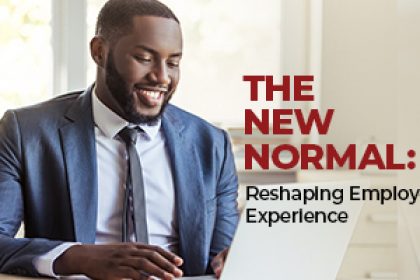The New Normal: Reshaping Employee Experience

The New Normal: Reshaping Employee Experience
The outbreak of the COVID-19 pandemic has resulted in the new normal especially in the work environment. Much considerations and implementations are now being assimilated into how employees should quickly adapt into this new norm. There is still a great need for organisations to factor in the relevant dynamics of work. The need to prioritise employees has also become quite paramount at this point more than ever to adapt required growth to business operations.
Employee experience goes beyond remotely working and having the tools to work with. According to Gartner, Inc. survey of 229 HR leaders recently, it was revealed: “nearly 50% of organisations reported 81% or more of their employees are working remotely during the coronavirus pandemic. Another 15% of those surveyed said 61-80% of employees are working remotely at this time”. This is good, however, if working remotely is the only thing an organisation is emphasising at this critical time, this means the firm is missing a chance to effectively redefine employee experience.
Now more than ever, it is important that leaders of organisations:
- Recognise the importance of human connection and find ways to facilitate continued collaboration and social interaction.
- Help employees regain a sense of control and help them be productive – even as new distractions make focus difficult.
- Ensure that technology operates smoothly and the right tools are available to help employees get the job done in new ways.
Tips for Improving Employee Experience
Communicate and Stay Calm
Both employers and employees need to stay calm. Therefore, the employer has a duty to ensure the line of communication is open and provide appropriate amounts of information about what the organisation is doing to support employees. It is important that communication should not increase the anxiety of the employees, this might be challenging for the organisation but employers and employees need to find ways to relax and rejuvenate.
Gartner’s analysis reveals that two-fifth of remote employees want more self-directed work, hence, employers must trust their employees and shift away from directing their work to coaching them to success. Focus should be on the employees’ work result as well as processes. To this end, communication should be evidence-based and forward-looking.
Enable New Relationships
Survey from Gartner Reimagine HR Employee showed that 41% of respondents don’t feel connected to their colleagues when working remotely and 26% of employees feel isolated when they work remotely. Organisations should work on learning the signs of distress to get the employees to do better at their jobs.
Vice president in the Gartner HR practice, James Atkinson said organisations have been very pragmatic and have done well adapting to the new normal from the technological standpoint. However, there is need to help the employees build social and emotional connections. This is to ensure individuals feel connected to their colleagues and the organisation while it also helps teams continue to work together seamlessly.
Leverage technology to keep people connected
Employees can stay connected in different ways, organisations can do the following to help their employees stay connected:
- Set up virtual team lunch breaks or virtual “happy hours”
- Set the tone by reaching out via SMS, video calls, and participating in group chats
- Appoint someone on the team to make sure everyone’s voice is heard during virtual meetings and actively ask a variety of people questions during a virtual meeting
- Create online groups and channels that encourage employees to discuss on how they’re handling this difficult time (e.g., productivity hacks, balancing kids at home hacks, etc.)
- Check in via SMS/calls, at a similar cadence as if everyone was working in the office together
Revamp Team Expectations.
It is crucial for organisations to set expectations with individual team members and the larger team to ensure effective individual contributions and team collaboration. Organisations should also emphasise individual and team objectives in such conversations.
Reduce Uncertainty
Organisations should reduce the uncertainties related to the work as this can affect workers’ cognitive reasoning and does not allow them function effectively the way they ought to. How certainty is created likely looks different for different employees. How it happens is less important than the fact that it does happen. In uncertain times, organisations need to step up and help create structure, certainty, and stability for their employees.
The Chief of Research for the Gartner HR practice, Brian Kropp said “If companies are not thinking through the employee experience they are creating, they could face significant attrition when the labour market opens back up.”
Additional information from: Forbes.com Gartner.com IBM.com






